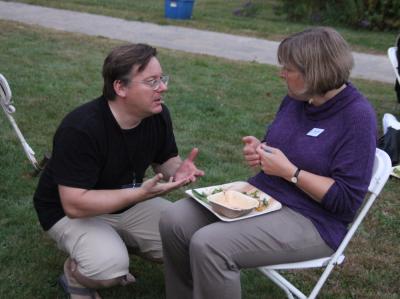Alumni Association Revival

After years of absence, the Marlboro College Alumni Association was revived last fall with the full support of the college, thanks to renewed passion among Marlboro’s alumni community and a core of committed alumni who took on the hard work of grassroots organizing. Given the possible transfer of Marlboro’s faculty, students, and pedagogy to the Marlboro Institute for Liberal Arts and Interdisciplinary Studies at Emerson College, this alumni revival came not a moment too soon.
“During this crucial time for the college, we recognize the importance of coming together,” says an October statement from members of the interim council, which now includes Heather Bryce ’04, John Coakley ’02, Daniel Doolittle ’95, Randy George ’93, Cate Marvin DuPont ’93, and Jessica Taraski ’91. The group met with 27 alumni on campus for Home Days in September, and has heard from hundreds more since then through their website and social media presence.
“We consider ourselves an interdependent association,” says Daniel. “We are independent of the college, but collaborate with the administration and trustees to share the voice of their largest constituency.” Marlboro has about 5,000 alumni, and nearly 600 had opted in as members of the association as of January—more than 10 percent in four months—ranging in class year from 1959 to 2019.
The interim council plans to have open, democratic elections for council positions in 2020, and to work in concert with the college to support alumni as well as archive their rich Marlboro memories. In the meantime, the council has made great strides in forming committees and connecting with alumni, the college administration, campus community, and trustees—one member, Randy George, is on the Campus Working Group, and a November survey by the council highlighted alumni priorities.
“It’s an incredibly interesting time,” says Daniel. “At first we were just launching the foundation to engage alumni, now we are retooling to serve changing alumni needs. We have to organize toward a completely different reality.” The Alumni Association helped make the Drop Some Love on Campus campaign a success, for example, and spread the word on the open session at December’s trustee meeting, providing alumni and other constituents access to the trustees. “One of our most important purposes is to serve as some sort of memory archive, or memory vessel, of the Marlboro experience.”
“The association gives alumni a space, which has long been absent, to process the potential closure of the college or work for different possible futures,” says John Coakley ’02, another interim council member. “No matter what happens to the Marlboro name, or the campus on Potash Hill, the Alumni Association will be there to provide that home. Marlboro’s alumni will not disappear, and their memories will only become more important in the future.”
